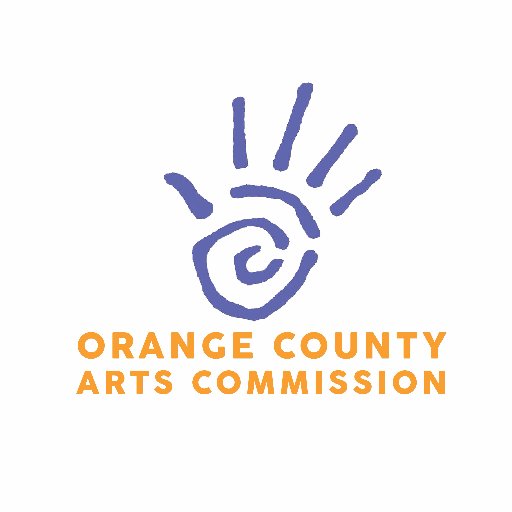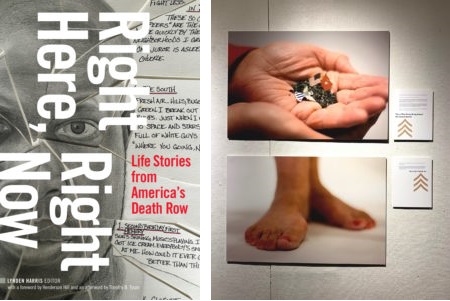By Arshia Simkin via the Orange County Arts Commission
Lynden Harris was working at the ArtsCenter in Carrboro, when she had the idea of Hidden Voices, an arts nonprofit whose mission is to share untold stories from diverse communities.
At the time, Harris explained, in the late 90s and 2000, arts organizations were on a mission to diversify their audiences and the approach was quite targeted: say, putting on a Black play in February or something to do with women’s issues in March. It occurred to Harris that there was a better way: “what would happen if you went in to the communities and asked them not what they wanted to see, but what they wanted to share?”
Among the first programs Hidden Voices facilitated—at the time, still at the ArtsCenter—was working with women who were incarcerated and also with survivors of family violence. The response to these programs was enthusiastic and Harris felt that the need to share these stories was clear.
Ultimately, the scope and medium depends upon what the community needs and what outcome they want to see. For example, when Hidden Voices was working in a historically African American community around Chapel Hill that was undergoing gentrification, the community’s goal was to communicate their history to their children; they wanted people to know “we were here.” For this project, called—Because We’re Still Here—Hidden Voices helped to create a walking tour that included a printed map with archival photos and a text message tour in which stickers that had a phone number were posted around the neighborhood. Members of the public could text the number for information about the location’s historical significance to the local Black community.The projects that Hidden Voices helps produce are expansive and often multi-pronged; they can range from short films, full length plays, text message tours, zines, photographs, and booklets, to objects created by audience participants. The projects can also include staged readings and facilitated discussions. “We’re not a theater group, we’re not a visual arts groups—we use whatever medium will best share the stories,” Harris said. The organization has a collective of artists who have worked with them for years—“this is an area rich in artists: we have mapmakers that we’ve worked with fifteen years or more; we have visual artists, photographs, dancers,” Harris said.
The longevity of the projects that Hidden Voices helps to facilitate is longer than at typical arts organizations; their projects can last years. “One thing happens and then other people come forward and it gets added to, so it’s a very organic, evolutionary process,” Harris said. For example, their At Ease project —the goal of which is to allow military service members to share their stories—has multiple parts that have been incorporated over time. For the project, military service members were asked what parts of their body they most associate with war, which were then photographed and displayed; they also wrote letters beginning with the words, “You have no idea…” in order to share insights into their lives that member of the public are often unaware of; and they created dioramas in the form of care packages as a visual representation of their experiences. These projects stemmed from workshops that Hidden Voices facilitated over the years and the resulting exhibits from these workshops— and other projects—are often on tour throughout the country.
Hidden Voices will present “Right Here, Right Now,” stories and songs from men living on death row and their families, March 12, 2022, from 2-5pm at the Carrboro Century Center. A panel discussion following the performance will be moderated by NC Representative Vernetta Alston with panelists Attorney Jon Powell, professor at Campbell University, Raleigh, NC, and director of the Restorative Justice Clinic;Because Hidden Voices centers marginalized communities, the projects can present unique challenges: take Serving Life: Revisioning Justice, a project that aims to give voice to death row inmates. For a time, team members from Hidden Voices couldn’t visit the prisoners or bring recording devices into the facilities; instead, they had to rely upon communication via letter. Out of these stories came COUNT: Stories from American Death Row, which is a full-length play; A GOOD BOY, a musical theater performance; and RIGHT HERE, RIGHT NOW: Life Stories from America’s Death Row, a book published by Duke University Press. Participation from attendees and viewers of the exhibits and performances is also crucial to opening and sustaining a dialogue: at performances members of the public are often given pen and paper to write letters to the incarcerated. These letters are then shared with the incarcerated men. It’s a way of creating “proximity,” Harris said.
Andre Smith, activist, meditation teacher, father of a murdered son, and volunteer at Nash Correctional Institution; and Lynden Harris, Executive Director, Hidden Voices. This event will be streamed live on Facebook at https://fb.me/e/1wV5GXUFS.
You can learn more about Hidden Voices at https://www.hiddenvoices.org/ Hidden Voices always welcomes conversation and support. You contact Hidden Voices via their email at info@ hiddenvoices.org; sign up for their monthly newsletter; or follow them on Twitter and Instagram @HiddenVoiceUS and on Facebook @HiddenVoices
 Chapelboro.com has partnered with the Orange County Arts Commission to bring more arts-focused content to our readers through columns written by local people about some of the fantastic things happening in our local arts scene! Since 1985, the OCAC has worked to to promote and strengthen the artistic and cultural development of Orange County, North Carolina.
Chapelboro.com has partnered with the Orange County Arts Commission to bring more arts-focused content to our readers through columns written by local people about some of the fantastic things happening in our local arts scene! Since 1985, the OCAC has worked to to promote and strengthen the artistic and cultural development of Orange County, North Carolina.



